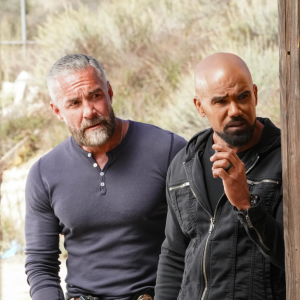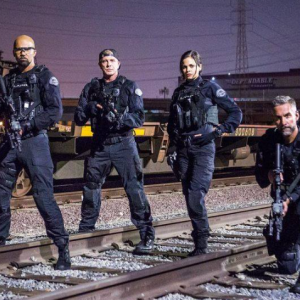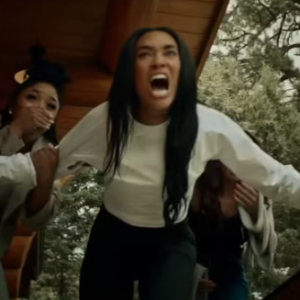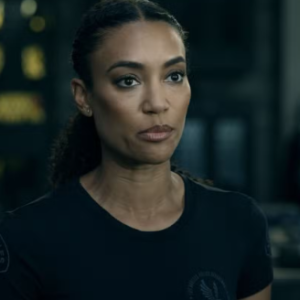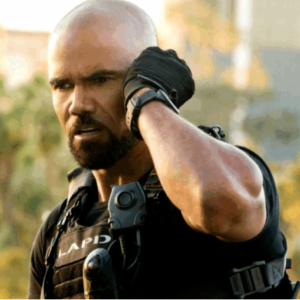When CBS announced the third cancellation of its beloved action drama S.W.A.T., many fans felt a familiar sting, believing it was the definitive end for Daniel “Hondo” Harrelson and his elite Los Angeles team. The news sent waves of disappointment through its dedicated fanbase, who had already rallied to save the series twice before. Yet, in a surprising turn that has reignited hope, actress Annie Ilonzeh, who joined the series as the formidable Officer Nicole Gomez, delivered a powerful message: “It’s not over yet. We still have stories to tell, and the passion behind this show hasn’t gone anywhere.” Her statement, far from a mere platitude, has become a rallying cry, suggesting that the fight for S.W.A.T.’s future is very much alive.
The journey of S.W.A.T. has been a rollercoaster of triumphs and near-extinctions. Since its debut in 2017, the show quickly carved out a niche with its high-octane action, compelling character arcs, and a timely focus on the complex dynamics between law enforcement and the communities they serve. Led by Shemar Moore’s charismatic portrayal of Hondo, the series became a consistent performer for CBS, drawing a loyal audience. Despite its success, S.W.A.T. has faced the chopping block an unprecedented three times. Each prior cancellation was met with an immediate, fervent backlash from fans and cast members alike, leading to public campaigns, social media movements, and direct appeals that ultimately swayed the network to reverse its decision. This history underscores the deep emotional investment viewers have in the series and its characters, demonstrating how a powerful fan base can truly impact a show’s destiny.
Annie Ilonzeh’s recent declaration holds particular weight because, as a cast member, she possesses an intimate understanding of the production’s pulse and the ongoing discussions behind the scenes. Her optimism is not a casual remark but a carefully considered one, hinting that active conversations about S.W.A.T.’s potential revival or re-imagination are indeed taking place. This insider perspective offers a concrete reason for fans to maintain their faith, distinguishing this current situation from previous cancellations that often came with more definitive terms. Her words validate the enduring connection viewers feel, suggesting that the creative team shares their belief in the narrative’s unfinished potential.
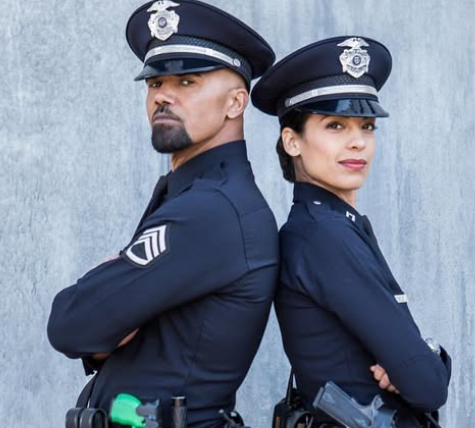
At its core, S.W.A.T. resonates so deeply because it’s more than just a procedural show about police work; it’s a character-driven drama exploring profound themes. Hondo, a native of South Los Angeles, constantly grapples with the dual responsibilities of upholding the law and protecting his community, often navigating the fraught territory of police accountability and systemic issues. His leadership is central, but the ensemble cast is equally vital to the show’s emotional depth. Sergeant Deacon Kay, the seasoned and morally grounded veteran, provides a constant ethical compass for the team, balancing duty with family life and faith. Officer Jim Street’s evolution from a rebellious rookie to a reliable, integral part of the unit has been a compelling arc, showcasing personal growth amidst professional challenges. The groundbreaking character of Officer Christina “Chris” Alonso broke barriers as the first openly gay female S.W.A.T. officer, offering a nuanced portrayal of identity, ambition, and personal sacrifice within a male-dominated field. Detective Victor Tan, with his sharp wit and tech prowess, adds another layer of expertise, while Officer Dominique Luca’s operational experience and humor provide essential support. The unwavering presence of Commander Robert Hicks grounds the team within the LAPD structure, often acting as both a mentor and a political buffer.
These characters are not merely cogs in a machine; their personal lives, relationships, and struggles—both on and off duty—are interwoven into the fabric of the show, making their triumphs and tragedies profoundly impactful for viewers. The series consistently tackles difficult, topical issues, from gang violence, drug trafficking, and human trafficking to issues of racial injustice, mental health, and veteran’s affairs. It presents a nuanced view of law enforcement, acknowledging its complexities and the human element involved, fostering dialogue rather than simply showcasing action. This commitment to telling diverse, meaningful stories is precisely “the passion behind this show” that Ilonzeh referenced, and it’s what has cultivated such a devoted following. The emotional investment in seeing these characters continue to navigate both external threats and internal struggles is a significant reason for the fan base’s tenacity.
The power of the S.W.A.T. fanbase cannot be overstated. Their organized efforts, from trending hashtags on social media to online petitions and direct outreach to network executives, have proven instrumental in the show’s past resurrections. This organic, grassroots activism demonstrates a level of dedication usually reserved for cult classics, transforming the audience from passive viewers into active stakeholders in the series’ survival. Ilonzeh’s message serves as a beacon, potentially galvanizing this formidable fan base once again, encouraging them to amplify their voices and remind decision-makers of the show’s value and the millions of stories that still resonate.
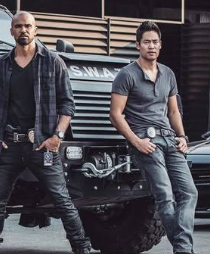
However, the world of network television is also governed by hard numbers. Production costs, particularly for an action-heavy series like S.W.A.T. with its large ensemble and elaborate sequences, are significant. Budgetary constraints, scheduling conflicts, and licensing agreements often dictate a show’s fate. While CBS might find the financial burden too heavy, the evolving landscape of streaming platforms offers alternative avenues for survival. A service like Paramount+ (which already hosts past seasons) or even Netflix, Amazon Prime Video, or Hulu could see immense value in acquiring a proven, globally popular franchise with an established fan base. Such a move could alleviate CBS’s financial pressure while allowing the narrative to continue, potentially with a renegotiated budget structure better suited for a streaming model.
Another strong possibility circulating among fans and industry insiders is the potential for a spin-off. Instead of a direct revival of the main series, the S.W.A.T. universe could expand, focusing on new characters or giving a beloved supporting character like Annie Ilonzeh’s Nicole Gomez her own narrative arc. A spin-off offers a fresh perspective, potentially lower production costs, and the creative freedom to explore different facets of the S.W.A.T. world while keeping the core themes and spirit of the original alive.
Throughout S.W.A.T.’s tumultuous history, Shemar Moore, as its lead actor and an executive producer, has been a tireless advocate. His personal appeals, both public and behind-the-scenes, have played a crucial role in reversing previous cancellations. His star power and genuine connection with the fan base give his voice considerable weight. While he hasn’t issued a new direct plea since Ilonzeh’s comment, her message may well be a prelude to further, more concerted efforts from the core cast, including Moore, to fight for the show’s longevity.
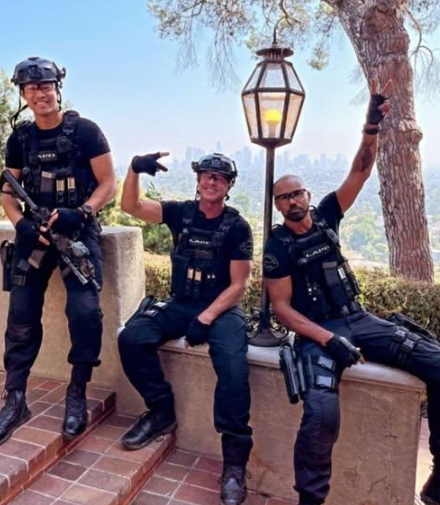
For its devoted viewers, S.W.A.T. is more than just weekly entertainment; it’s a narrative that explores the complexities of contemporary society through the lens of a close-knit professional family. The recurring threat of cancellation feels like the repeated loss of that family, making Annie Ilonzeh’s words not just a source of hope, but an affirmation that their emotional investment is understood and reciprocated by the show’s creators and performers. This current situation, unlike past cancellations that often felt more final, carries an air of open-ended possibility. The simple statement, “It’s not over yet,” serves as a potent reminder that the creative well is not dry and the desire to continue these stories remains strong.
The legacy of S.W.A.T., regardless of its ultimate fate, is already secure. It stands as a testament to diverse storytelling, thrilling action, and courageous explorations of community, justice, and the nuanced morality of law enforcement. It has fostered important conversations and provided a platform for a range of compelling characters. But for now, the conversation is not about legacy in the past tense, but about a vibrant future. With passionate fans, a determined cast, and a wealth of unresolved storylines and character arcs waiting to be explored, the narrative of S.W.A.T. remains, as Annie Ilonzeh so powerfully suggested, an open book. As history has proven time and again, it would be unwise to ever count Hondo and his S.W.A.T. team out. Their fight, like the show itself, continues against all odds.
